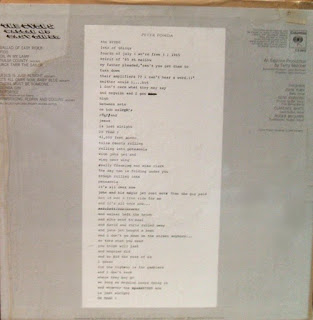
Sunday, August 26, 2012
Ballad of Easy Rider - The Byrds
Ballad Of Easy Rider
The Byrds
Columbia CS 9942
1969
I was very sorry to see that Neil Armstrong died. He was my hero when I was a kid. I followed the space program very closely and considered astronomy or astro-physics as a possible career choice up through high school. I don't have many memories of the 1960s but the moon landing is one of my most vivid ones. So to honor this great man, I decided to blog about the album that has my favorite pop song about him, "Armstrong, Aldrin and Collins," well actually it it the only pop song about him I'm aware of. I bought this album while I was in high school when it turned up in the used record store that my crappy suburban town briefly had. It was the first Byrds album that I bought that wasn't folk-rock and I was really disappointed by it. I like it much better now although I still consider it flawed for which I mostly blame Roger McGuinn. He only contributed a single song to the album which left a big void to be filled by a band that no longer had songwriters the caliber of Gene Clark and Gram Parsons or even David Crosby. Supposedly McGuinn was preoccupied with the stage musical he was working on and his lack of interest in the album is evident throughout. McGuinn's sole composition was not a new one, but rather a new recording of "Ballad of of Easy Rider" from the film "Easy Rider." The full band's recording supplemented by strings is superior to the movie version which was just McGuinn solo, but not as good as Fairport Convention's version. It is followed by John York's "Fido" which sounds nothing like a Byrds song. It is a mediocre song made worse by a dumb drum solo. York isn't that good of a singer but he sure beats Clarence White who sings the lead for the traditional hymn "Oil In My Lamp." It sounds a bit like George Harrison fronting Hot Tuna although I do like the guitar work on the song which enlivens the otherwise monotonous tune. Fortunately McGuinn is back behind the mike for "Tulsa County Blue" (listed as "Tulsa County" on the album.) It was composed by Pamela Polland and is one of the best songs on the album, very "Sweetheart Of The Rodeo." There is some fine picking from Clarence White supported by Byron Berline's fiddle playing and a nice harmony vocal from York who was also responsible for the suggestion to cover the song. The side concludes with McGuinn singing the traditional English folk song "Jack Tarr The Sailor." The song recalls McGuinn's folk roots and reminds me a bit of the Byrds' great cover of "John Riley" on "Fifth Dimension" in the way its rock and roll energy infuses the song with tension and drive. McGuinn's vocal is very powerful and I dig the fuzzed out heavy riff by White. Side two begins with the band's energetic cover of Art Reynold's "Jesus Is Just Alright" which flopped when it was released as a single for some reason. It is a really catchy and compelling song that takes full advantage of the band's instrumental prowess. It would later be a hit for the Doobie Brothers with a punchier arrangement that sounds like it was influenced by Santana. Up next is a cover of Dylan's "It's All Over Now, Baby Blue." The Byrds had attempted it back in their folk-rock days but didn't release it (you can find it on the Byrds box set.) This second attempt isn't any improvement, I greatly prefer the first try. The band delivers a slow, mournful country-rock take on the song, that is pretty but dull. Gene Parsons brought Vern Gosdin's "There Must Be Someone" to the album and sings lead. Reportedly McGuinn wasn't even at the session that produced the take and I believe it, it sounds nothing like a Byrds song. It is another dud. Parsons atones for this by writing the next song "Gunga Din" which is my favorite song on the album. The song has nothing to do with Kipling, it is an account of the Byrds' experiences in New York City. I was always puzzled by the song's title but I read in Johnny Rogan's book on the Byrds that Parsons says he picked the name because it worked as a rhyme which still seems weird to me. Nonetheless it a wonderful song with a soaring, uplifting chorus. It reminds me a bit of Glen Campbell. McGuinn reaches back into his folkie past for Woody Guthrie's "Deportee" which McGuinn had worked on for Judy Collins' "Judy Collins #3" album. The song seems like uninspired filler to me. The album concludes with "Armstrong, Aldrin and Collins" which came from Zeke Manners and Scott Seely. Producer Terry Melcher and McGuinn edited the song down to a single verse preceded by a countdown and some sound effects. The moon landing had occurred during the recording sessions for the album and since McGuinn shared my interest in space travel, he presumably wanted to acknowledge it. It was the final track recorded for the album and McGuinn was alone at the session. The song is practically a throwaway but I still find it kind of moving. Despite all its flaws this album was the last good studio album the Byrds would ever record. York was fired after the album and replaced with Skip Battin, a guy who was even worse at writing Byrds-style songs than York was. In his liner notes Peter Fonda says "whoever the BYRDS are is just alright" but he probably hadn't met Battin yet. Recommended to people who prefer "Sweetheart of the Rodeo" to the "The Notorious Byrd Brothers."
Labels:
1969,
Byrds,
Country Rock
Subscribe to:
Post Comments (Atom)


No comments:
Post a Comment